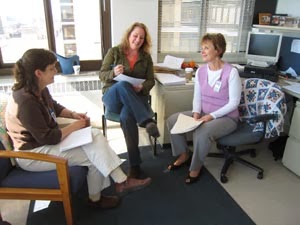-
Read. Keep up to date with the sector through journals, blogs etc. It is really important for us to stay abreast of all the goings on in our sector. Sign up to newsletters and blogs of your industry groups as well. Your inbox will always have something interesting to read.
-
Network. When you have an empty lunch date then meet with a colleague. I try to have at least one lunch meeting or coffee with a colleaague per week and when I have a spare moment it makes it easy to catch up with a member of my network.
-
Plan. Whether it is your self care or the next step in a project, use this time to make your goals clear. We all whinge when we don’t get planning time!
-
Tidy up. Your desk, the games locker, your resources they all need a spruice up.
-
Take the gravy. Take the moment to relish in the fact that the world has not ended and you have time to just sit. It is not every day you have time to do something out of the box. Perhaps you have a project you have been dying to pitch to your boss… use the time to reflect.
Monthly Archives: January 2014
Hot potatoes for youth worker’s: I was sexually abused.
-
Remember your duty of care. Any disclosure of abuse needs to be taken to the appropriate authorities. You are there for their safety first and foremost.
-
Make sure that they are currently safe and that they will continue to be safe. If they disclose that they are being abused at home and that it happens every night then they need to be protected now… not in a couple of weeks.
-
Listen to their allegation. If you have already spoken to them about your duty of care and they continue then they genuinely need to get it off their chest. Listen intently so that you can make notes later.
-
Refer them to the police and child protection. In most developed states and countries the police and child protective services are the ones tasked with investigating abuse claims. You are not an investigator, you are a confidant.
-
If it is possible, contact the young persons parents and involve them in the process of referral and healing.
-
Finally make notes. you may be called on to give evedence in a court case so as soon as is practicable write down a detailed description of what was said and what you observed from the young person.
When your policy says nothing: Youth work practice wisdom
Using writing as a tool for critical reflection: Youth worker skill building
I always hated journaling. When I was a young intern in my 20’s I absolutely hated Tuesday morning as it was journaling time. My other intern colleagues would open their books and just write. I would stare at the blank page and start to sweat. I am sure my supervisors thought I was wasting time…They told me as much… but I just couldn’t put pen to paper and make sense of my world.
-
Write about the situation that is causing you concern from a different vantage point. The clients, a parents the fly on the wall.
-
Spend five minutes free writing (what ever comes out of the end of the pen when you put it to paper) then pick one idea or word from that and write about it.
-
List all your feelings about a situation and then write for five minutes about one of them.
-
List all the people involved in a situation and then write a short bio as if they were actors and the situation is a play.
-
Write a letter to yourself about the situation in the third person
-
Write a letter to a child about why you love your job
Mental health should be a major part of a youth workers training.
Be kind to youth work students: they are the future of the profession.
As a youth worker with over a decade in practice a number of qualifications and a private practice I have supported many youth workers on placement. In these situations I have tried to provide the best learning environment for each individual student. However many youth workers report that they are little more than gofers. Go for coffee, go for printing, go for this meeting.
This unfortunately is not an uncommon experience of students on placement. As a field placement supervisor I have spoken to dozens of students over the past year about their experience and the vast majority have felt like goffers. Go for coffee, go for my printing, go for … The list is endless. Students, particularly in their final year, need to be allowed to practice their skillset not just watch as it is done by others. They need opportunity to practice in a supervised environment to gain confidence and experience. They need supervisors who can let go of their work and pass it on to them.
If you are going to take on a student this year here are a few ideas to help them and you integrate as much as possible.
- Reading is essential to any job but more than a week of reading policies and procedure manuals is over the top.
- Regular weekly supervision that addresses different aspects of the role is essential. Dont just ask about tasks, but set articles to be read before sessions to stimulate conversation.
- Dont expect students to know everything.
- Expect them to be competent at a first job standard.
- Give them genuine tasks to sink their teeth in. They may be cheap labour, but they are useless to you as goffers! Remember it is costing the student to do the placement.
- Have a plan of action from day one with a number of tasks that must be achieved and review this weekly.
- Finally, get to know your student and have space for them to get to know you.







